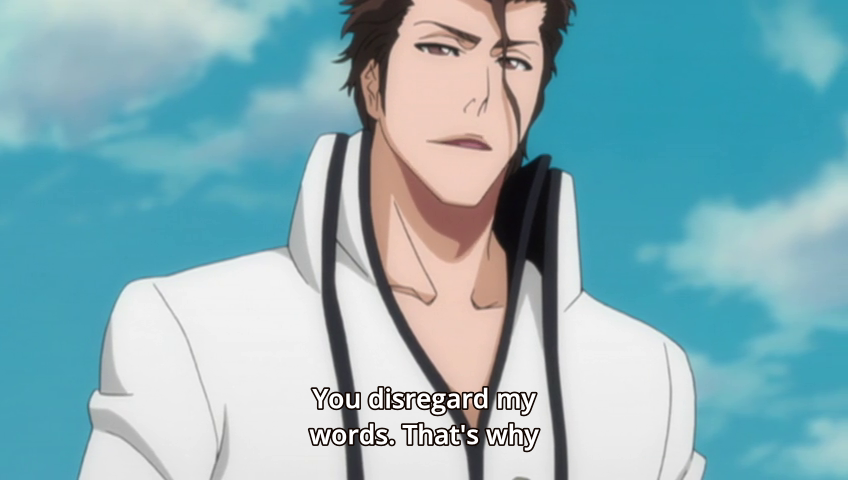There is something about the use of language that has always captivated me.
Supporting the words, there is the intonation and inflection, and behind them, the intent and implication.
Some are easier to pick up. Others only reveal themselves much later.
Just as certain groups and communities speak in code, both to identify themselves to one another and to exclude outsiders, I find it much easier to talk to certain people, who "get" what I'm saying and, just as importantly, what I'm not saying.
Some may call this "being on the same wavelength" or "having rapport", and there is certainly some of this involved.
More than that, there is a certain shared desire for pursuit of mastery of the language. And I believe that it is this pursuit that we identify in each other.
There is a certain scene (screenshots below) in the anime Bleach that I thought is worth exploring here.
In the scene, Aizen, the antagonist of the season, in true villainous monologue style, chastises his opponent, Yamamoto, head of the forces of "good" and the strongest supporting character of the season (because who can be more powerful than the protagonist, right?), for disregarding his warning - one that is veiled behind seemingly-inconsequential earlier explanation.
I identify very strongly with this particular scene because it reminded me of the countless times I worded carefully only for them to be missed entirely.
Barring his intensely self-absorbed, destructive, and somewhat sociopathic tendencies, I find the antagonist Aizen pitiable - for having an exceptional, brilliant mind yet not being able to find his equal for discourse and debate.
Would he have turned out differently had he found such a one?
There's No Such Thing As a Fish? Really?
Some time ago, the term "fish" was used to categorise almost any water-dwelling creature - think shellfish, cuttlefish, starfish, etc.
Even dolphins and whales were categorised as fish at the time.
The term was later used mainly for "fin fish", which, as the name suggest, have fins or fin-like structures and are typically streamlined. This includes sharks which have a cartilage skeleton, as opposed to a bony one.
And then, a quote attributed to paleontologist Stephen Jay Gould purported that "there is no such thing as a fish".
It comes from the premise that "fish" are so biologically different from each other that it isn't quite right to place them all in the same category.
Of course, there are supporters, as well as opponents of this view. I'm not here to debate for one or the other.
I merely find the evolution of language and meaning fascinating, especially through different cultures and disciplines.
It reminds me that the words of today may mean something very different in the future, or may fall out of use entirely.


